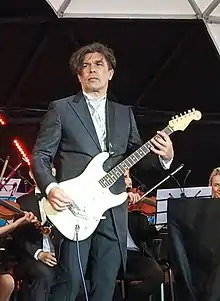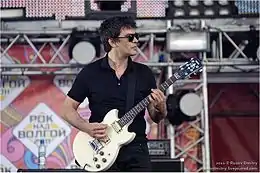Yuri Kasparyan
Yuri Dmitriyevich Kasparyan (Russian: Ю́рий Дми́триевич Каспаря́н, born 24 June 1963) is the former guitarist of the Russian rock band Kino[1] and an ex-member of Vyacheslav Butusov's group U-Piter. With Butusov he jointly wrote the 1997 album Незаконнорожденный (Nezakonnorozhdennyy; English: Bastard).
Yuri Kasparyan | |
|---|---|
Юрий Каспарян | |
 Yuri Kasparyan in 2019 | |
| Born | Yuri Dmitriyevich Kasparyan June 24, 1963 |
| Occupation |
|
| Years active | 1983-present |
| Spouse(s) | |
| Musical career | |
| Genres | |
| Instruments |
|
| Labels |
|
| Associated acts | |
Early life
Kasparyan was born on June 24, 1963 in Simferopol, to entomologist Dmitry Kasparyan and biologist Irina Guslits. In 1964, his family moved to Leningrad, where he grew up. From 1970 to 1977, he studied cello at a children's music school in Pushkin. But after getting interested towards Western rock music, he preferred to play guitar. In the late 1970s, he played in various student band groups.[2]
Music career
In early 1983 he met Viktor Tsoi. Having become his main associate and close friend, he began to participate in rehearsals and recordings, and later became the lead guitarist of Kino until 1990. According to musician Boris Grebenshchikov, Kasparyan was a poor guitar player initially, but he quickly progressed and eventually became the second most important member of Kino.[3]
From 1985 to the early 1990s, he took part in concerts and recordings, including music for films of the band Pop-Mekhanika by Sergey Kuryokhin. From 1986 to 1989 he took part in performances and recordings of songs by Joanna Stingray. In the spring of 1987, together with the members of the bands Novyye Kompozitory and Kino, he recorded the album Start. In the late 1980s, along with Kino, he toured extensively within the republics of the USSR, as well as Europe and the United States. In autumn 1990, he was baptized and took the name 'George'. As of present, he only uses the name as a pseudonym.[4]
Following the death of Viktor Tsoi in a car accident on August 1990, Kino broke up after releasing their final album, consisting of songs that Tsoi and the group were working on in the months before his death. Kasparyan left the stage for several years and studied esotericism and philosophy. He worked with the art group Atrium-Alfavi by Sergey de Rocambole as a composer until 1999. He wrote music for a number of conceptual projects, such as Taranavtika and Artikulyatsiya. He also recorded the instrumental album Klyuchi Drakona. He also experimented with combining conceptual format with rock and pop music.[5]

In 1997, Kasparyan, Vyacheslav Butusov and their mentor Sergey de Rocambole recorded a joint album entitled Nezakonnorozhdennyy al'-khimik doktor Faust – Pernatyy zmey. From 1999 to 2001, Kasparyan worked on the Zvezdnyy Ublyudok project together with Butusov and Igor Tikhomirov. In September 2001, together with Butusov, he founded the band U-Piter. In 2005, a department of songs of Kino appeared in their repertoire. In December 2010, the first concert of the Simfonicheskoye Kino took place. In 2014, he was nominated for the Top 50. Most Famous People of St. Petersburg Award in the Music category.[6]
On February 26, 2017, after the final Siberian-Ural tour, U-Piter ended its activities and formally disbanded. In the summer of 2017, he founded a funk-disco group SHIK Proyekt. Since December 2017 he is part of the music band Ronin, which was founded by Viktor Tsoi's son Alexander.
Personal life
In the mid-1980s he married Joanna Stingray (born: Joanna Fields), an American singer and socialite who helped to popularize Soviet and post-Soviet rock culture in the West during her time in the Soviet Union. They divorced in 1991.[1]
Kasparyan currently resides in St. Petersburg.
References
| Wikimedia Commons has media related to Yuri Kasparyan. |
- Jaszi, Sabrina; Huey, Steve. "Biography: Kino". Allmusic. Retrieved 25 May 2010.
- "Юрий Каспарян: новые грани песен группы «Кино», одна поездка в Ереван и дудук". armmuseum.ru. Retrieved 21 October 2020.
- "В. Цой и группа КИНО: Юрий Каспарян. Боролись за одно – напоролись на другое…". rockarchive.ru. Retrieved 21 October 2020.
- "Каспарян Юрий Дмитриевич". ruspekh.ru. Retrieved 21 October 2020.
- "Последний герой. Тридцать лет назад погиб Виктор Цой". ria.ru. 15 August 2020. Retrieved 21 October 2020.
- "Творчество Виктора Цоя дошло до Кремля". mskgazeta.ru. Retrieved 21 October 2020.